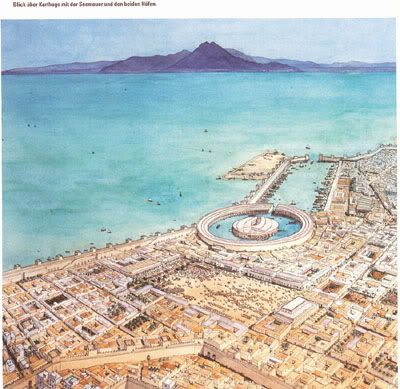Here's the second part of the update! Enjoy!
“Assassination is a word I loathe to contemplate.” –
Roman Statesman, by Albrecht von Franken
December 25th, 1229
The Christmas Feast of 1229 should have been a joyous occasion. Roman rule had been established across the entirety of the North Africa coast, from the Pillars of Hercules to the Sinai, a feat that hadn’t been seen since the days of Justinian. Yet amidst the sea of gaiety and celebration at The Christmas Feast of Two Emperors, one person stood out for his singularly gloomy expression.
The famous ancient double harbor at Carthage. In the days of the old Roman Empire, the outer harbor served as a commercial port, while the closely guarded inner harbor served as a military base. By 1229, the Komnenids had re-dug the twin harbors on a slightly larger scale. Carthage as rebuilt was now the center of Roman power in North Africa, and a large commercial center in it’s own right, boasting almost 60,000 residents as well as a palace fit for an Imperial visit or celebration, as that of December 25th, 1229.
Antemios Komnenos, eldest son of the Emperor.
This day, it was what was going on at the front of the banquet hall in the Palace of Carthage that drew his ire. Antemios grumbled for the eighth time in the last hour, and finished his cup. It was impossible to avoid the scene at the far end of the room. On a raised dais, flanked with deep furs and gold, sat the imposing form of Antemios’ father, grimly set apart from the sea of feathers and silks in his plain tunic and breeches… and if this wasn’t enough, on the Emperor’s lap sat the garishly clothed form of Marjun al-Hawa, giggling like an insane schoolgirl and plainly perturbing flanking nobles from both Spain and the Empire. Yet so long as Emperor Thomas put up with the little girl-man—Antemios couldn’t think of any other way to describe him—no one dared say anything. The last person that had…
…Antemios shuddered.
Sitting next to this ugly scene was the more appropriately clothed form of Emperor Alexios I, draped in his blue and tyrian purple robes of state. More than a few had noticed, however, that the Western Emperor’s eyes, normally bright and sharp, were only dimly looking at the world about him. Every now and then he’d slurringly laugh at some inane joke made by al-Hawa, prompting the uneasy Spaniards around him to chuckle to keep form. Gossip around the party said that Emperor Alexios, despite being only 44, was slowly wasting away, much like his grandfather had. Just like the great Basilieos, Alexios had taken to drink as well.
Further down sat Alexios’ son Nikephoros, heir to the Western throne. Nikephoros was a question mark to Antemios—he’d never had the chance to speak to his distant cousin, though he’d heard the 25 year old man was a dullard at best. Like most days, the Crown Prince’s plate sat empty—rumor said he ate little other than figs and an occasional lemon. The mere thought of a lemon made Antemios hungry. He snapped his fingers, and yet more pastries were proffered before his grubby fingers. He eagerly grabbed a handful, then waved the servant away.
As Antemios licked the sugar clean from his fingers, he spotted his sister Zoe, and her new husband, Demetrios Scolari, the new Prince of Azeribijian. The young man was nearly as fat as the prince, and by the look on Zoe’s face, it was clear she did not like the comforts of her new ‘husband.’ Antemios watched her eyes focus first on one of the guardsmen, then the son of Prince Fahd, now
Exarch of North Africa under the Western Empire. He grinned lewdly—he knew his sister, he could only imagine what was going on in her mind.
Yet that thought was rudely interrupted by a giggle of laughter on his left. There stood Theodoroa Donauri, easily the most beautiful girl in court, her eyes firmly rooted on…
…Gabriel.
Theodora Donauri. Daughter of the famous commander of the Basilikon Toxotai, Theodora was perhaps the most renowned beauty in Konstantinopolis. However, she held eyes for only one man—Gabriel Komnenos, much to the envy of others all across the city, and even the Empire.
Antemios’ eyes narrowed. Gabriel was clearly already the center of attention on the left—clusters of
dynatoi and
strategoi were clustered around, shaking his hand, patting his back, showering him with the praise Antemios wanted for himself. To add to the whole affair, Antemios could see the eyes of most women in the ball room, and more than a few of the young men, were shyly ogling his handsome brother. Some, like the comely Theodora, were not so shy about their glances.
Antemios gritted his teeth, rudely held out his goblet again. Why Gabriel? He was a lech, he was boorish, but he was the apple’s eye of everyone, wherever he went! Even now, he almost disdainfully ignored their adulation, their praise, he was so busy drinking his wine and smiling at Theodora!
Antemios was the eldest, he was the firstborn,
he should have had the vanguard and been the center of the feast, instead of wasting his summer in the North African heat only to be told his brother had won all the battles, and all the glory!
Perhaps he could earn his own glory. There had been a great deal of talk that after the Emperor held up his bargain to his Western cousin, that he would turn East against the hard-pressed Turk. Antemios swirled his wine around, thinking. Another foray to the East was a guaranteed victory—the Turks were weakening fast under the renewed attacks of the Mongols, and in Antemios’ mind, it was more a question of whether Romanion would take the Turkish lands, or the Great Khan. A turn east would get Antemios his own shot of glory—his father would insist on overall command, and Gabriel wouldn’t get a chance to rush ahead and steal all the fame for himself.
He smiled ever so slightly at the thought—Antemios Komnenos,
strategos, leading his cavalry in a charge…till he glumly remembered he was awkward at best and ludicrous at worse on horseback. He downed his cup and sighed—glory on the battlefield never came to those who slogged through the mud.
Gabriel would have the glory again, unless something happened.
That thought brought another brief smile. Perhaps something could be arranged to happen to Gabriel… Antemios knew of several men of the dark that went to his brother’s chambers at night—it’d be easy to slip one of them a knife and some gold. After a moment of running through the possibilities, Antemios sighed. There was the major problem of where a naked body could hide a knife, and Gabriel’s skill at unarmed combat. For a moment Antemios thought maybe several assassins could fix that problem, but in the end he decided it would be too much work. He raised his goblet, and soon he felt the soothing flow of
grappa down his throat yet again.
A soothing flow that was suddenly interrupted by the cough of a small boy clearing his voice.
“Cousin Antemios?”
The Crown Prince turned, and found himself facing the short, spindly form of his distant cousin Nikephoros, son of the Crown Prince of the West. The boy had raven dark hair and deep eyes, easily inherited from his mother, the descendant of some Moorish family. Even as Antemios sighed in complaint, the boy continued his pestering.
Nikephoros, son of the same and grandson of Alexios I Komnenos, is in direct line to become Emperor of the West. Despite being only seven, he’s shown an amazing ability with languages, as well as a gift for skills both martial and intellectual pursuits.
“Why are you all alone, on this side of the room?” Nikephoros the Younger went on. “Everyone is happy and gay, and you’re a glumface.” Nikephoros then added, “I learned three days ago how to say glumface in Arabic. Do you want to know?”
“What is there to be happy about?” Antemios grumbled, ignoring the boy’s question.
“Your brother and his triumph!” Nikpehoros grinned. “Isn’t it wonderful?” the young Nikephoros pressed onward, despite Antemios’ growlings. “A quick victory using the locals as his sword and shield! Your brother is gifted! I heard your father say he’s getting a triumph in Konstantinopolis!”
“I know. Wretched, isn’t it?” Antemios sighed. He held his goblet out—the sound of more wine pouring was the only soothing noise around.
“Why didn’t you come up with that idea?” the boy asked, ignoring Antemios’ sigh.
“I have a million ideas,” the Prince looked down into his goblet. He wished the cup was wide enough he could just jump in. That’d fix it all—too bad no one had a goblet that large. He sighed, turned, and glared at his distant cousin. “All of my ideas point to certain death.”
“Certain death?” the young Nikephoros laughed. Clearly the seven year old didn’t understand Antemios’ threat. “How so? Does your gaze kill? It hasn’t harmed me!”
“It’s harmed many a servant,” Antemios pressed, before turning his back. Perhaps ignoring the pest was the best way to get rid of it. After several moments of no noise from his cousin, Antemios thought he might have succeeded—until he noticed the ambient noise of a banquet suddenly changing to worried murmurs. Then loud coughing.
Antemios spun around just in time to see his brother clutching his throat, as the murmurs turned into screams and gasps. Al-Hawa was off the Imperial lap, dashing across the table dodging candlesticks and quail, as others rushed to the Crown Prince’s side.
“Something is wrong with your brother!” Nikpehoros shouted. Antemios grimaced—so the wretch hadn’t left yet.
“He’s probably been poisoned,” Antemios muttered after downing his goblet. A servant bumped him hard as bedlam broke out in the banquet hall, shouts and screams drowning out the noise of Gabriel’s desperate coughing. Within moments, Antemios was utterly alone as a sea of people surrounded Gabriel as he struggled to gain his breath.
“Typical,” Antemios sighed. “Always the center of attention.” Longingly, the Prince eyed his goblet. “Even you don’t stay with me long enough.” As servants carried off Gabriel’s stricken form, Antemios simply swirled his wine around. “Too bad it wasn’t me,” Antemios sighed yet again. While all eyes turned to the sputtering prince, the eldest son of the Emperor merely finished his wine. “That would’ve been too much work,” he added quietly.
Antemios
==========*==========
March 4th, 1230
Mehtar Lainez looked up, and sighed. The former
Megoskyriomachos had two reasons to sigh, and ironically the modest hovel he now called home thanks to 13 years of disgrace was not one of them. One was in the kitchen, bubbling and boiling while Lainez’s stomach cried out for food, while the other paced incessantly before him, in effect preventing him from getting to his soup.
“Do you want any soup?” Mehtar offered, trying to stop his protégé’s errant pacing.
“I’m not hungry,” Albrecht von Franken said testily. Inside the modest home with its wooden plates and simple bowls, the finely attired von Franken, complete with the robes and chain of
Megoskyriomachos, looked out of place, at best. Mehtar got up with a grumble. While he would always be happy to help his protégé in any way he could, he couldn’t suffer needless pacing while food called.
“The young prince lives,” Mehtar said hopefully, shuffling into the kitchen to poke at the fire some more. “Whoever plotted this failed, as they will undoubtedly do again after you’ve found the best way to protect His Highness…”
“Who could dare to do such a thing?” Albrecht snapped.
“Many people,” Mehtar replied. He started to dip the ladle into the soup—it looked done. “Soup?” he offered again. Albrecht shook his head, prompting the former
Megoskyriomachos to sigh. “Fine, no soup for you.”
“The attempted assassination…” Albrecht said testily.
“Calm, calm!” Mehtar set down the ladle and raised his hands. “I’m thinking on it! I’m hungry too!”
“It was Bardas!” Albrecht resumed his pacing. “I know it! If Thomas’ three sons are gone, then Bardas is the logical successor! He has blood from Basil III, he’s a respected commander, he’s
Despotes…”
Bardas Komnenos was perhaps the most obvious culprit. The 48 year old grandson of the infamous Leo Komnenos leads a lion’s brood of Italian Komnenids, and is also still officially Despotes of Italy in the name of Emperor Thomas, even if the title has little authority since the end of the civil war. However, Bardas used both the war and its aftermath to install cronies all over the peninsula, and only reluctantly gave up claims on being Kaisar once Gabriel reached his majority. Descendant of Leo, brother of Basil, he styles himself the leader of the Leonid Komnenids.
“Bardas is clumsy at best, and brutish at worst when it comes to the darker arts,” Mehtar interrupted, dipping his ladle back into the soup. He brought some of it up to his lips, sipped, and sighed. “Excellent!” he murmured, before offering the ladle out. “You sure you don’t want any?”
“No!” Albrecht snapped. “For the last time…”
“Fine. More for me,” Mehtar tsked, grabbing a bowl. “If it was Bardas, he would’ve sent a gang of assassins to try to ambush Gabriel and his brothers on a hunt, not tried some form of subtle poison that escaped the food tasters.”
“He could have bribed them!” Albrecht announced, his mind now obviously careening down a new potential route of danger. “If he did, that means…”
“You hand picked those men, did you not?” Mehtar raised an eyebrow as he shuffled over to the modest table and set down his precious soup bowl. “If you hand picked them, trust yourself a little.” At Albrecht’s withering gaze, Mehtar smiled. “I trained you well, and I know you. You wouldn’t have hired anything except the best of the best. It wasn’t that. It simply wasn’t Bardas.”
“Then who else!?” Albrecht stopped his pacing and hissed at his former mentor. “Bardas has the motive, he has the means to finance…”
“Any one of that entire wretched family,” Mehtar muttered between spoonfuls. There was too much cinnamon, and not enough onion. He’d keep that in mind next time he made the recipe. “Theodoros in Damietta, for one,” Lainez added. “He has the wealth, and the
idle time to plot such an assassination.” Mehtar’s faced winced. Ah… there was the garlic.
“Go on…” Albrecht urged impatiently.
“Think on it,” Mehtar said after a moment after spitting the uncut garlic out of his mouth, “Bardas has motive, yes, but Bardas is too busy knocking off errant Italians to even contemplate the planning needed to set up a plot like that. And,” Mehtar added, “he’s too much of a dullard. And that’s not even counting Michael of Antioch.”
“He’s… a dullard!” Albrecht sputtered. “He’d never come up with anything as precise as staging a poisoning over a thousand miles away!”
“But his nephew and son are,” Mehtar smiled. “Have you even considered Adrianos, in Edessa? Now there’s a spider for you,” Mehtar went on. He did have some admiration for the man. He’d been only 18 when his father was killed at Tabriz 17 years before, and the young man had turned into a shining example of the good and bad available in the Komnenids. On one hand, he’d turned his principality around, rebuilt its armies, streamlined its taxation, and built roads and infrastructure. On the other, he’d brutally slain all opposition, and any disorder was completely, utterly crushed.
The additional suspects:

Prince Theodoros of Damietta, who is know amongst the Arabs of his theme as Abdul Majhid, or “Servant of the Messiah,” as a token of respect. Only 24, Theodoros is perhaps one of the most formidable commanders in the Empire, even though his boorish behavior tends to drive others away. Great-grandson of Eudoxios, brother to Basil III, he has perhaps one of the strongest claims to the Imperial throne outside of the descendants of Basil himself.
Adrianos of Edessa is likely outside of Bardas the most powerful claimant to the main Komnenid line’s throne. A descendant of the line of Christophoros Komnenos, his claim might be slightly more distant than that of Theodoros of Bardas, but his titles as Prince of Edessa and Coloneia give him an immense amount of power. Still young at 35, Adrianos has been often seen as proud and aloof from politics, but this could easily be a cover for more cloak and dagger activities…
Michael Komnenos, Prince of Antioch, is perhaps the least threatening of the major claimants. Not only is his claim the most indirect—through the uncle of the Megos—he is also considered something of a dullard. However, both his son Konstantinos and his nephew Anastasios, however, are keen on raising their family’s station to the purple, by any means necessary…
“Point is,” Mehtar finished, “it’s simply too early to fixate yourself on one suspect. At this stage everyone could be a suspect.”
“Well, then what should I do?” Albrecht stopped his pacing. “I know diplomacy, not…” he waved his hands about, “assassin’s work!”
“Well, you could use your mind,” Mehtar said grumpily. His bowl was empty. “Send out official messengers saying the Crown Prince has died.”
“But he’s walking about, and it’s only a matter of time before he starts whoring about again!” von Franken complained. “Everyone will see through that ruse if…”
“First, send him away, to Wallachia or something. Your good friend Kokkinos is the Prince there. You trust him with your life?”
“Yes?” A confused Albrecht sputtered, but Mehtar pressed on.
“Good. Send good men with the prince, have him lay low for several weeks—long enough to test the responses of the great Komnenoi.” Mehtar started to rise—the soup needed something else with it. “Second, Prince Gabriel isn’t a whore. ‘Whoring about’ is thus an abuse of the Greek language.”
“He’s a whore!” Albrecht hissed. “He sleeps with…”
“Does he ask for money for his services?” Mehtar leaned forward, his voice deadpan.
“No, but…”
“Then he is not a whore,” the old man gave a toothless grin and leaned back in triumph.
“But… it’s the scandal of court, and…”
“Of course,” Mehtar sighed. “The Komnenoi have always had problems with the weight of their trousers.” The old man shuffled towards a nearby room, and soon Albrecht heard the clatter of pots and pans. Mehtar knew what would go best with the soup—a side of meatballs. “Enough of this!” Mehtar called. “Stop worrying, you’ll know your culprit soon enough, and the Crown Prince will be safe! In the meantime,” Lainez began grabbing for some onions and garlic, “I have learned from a Varangian how to make the most wonderful meatballs!” he called a few seconds later. “Come, Albrecht! I hope your chain of office hasn’t made you forget how to cook!”
==========*==========
So there you have it! Who tried to kill Gabriel? Will the Crown Prince be safe in hiding? Will Albrecht and Mehtar discover who is at fault in time? More will be revealed on Rome AARisen!











